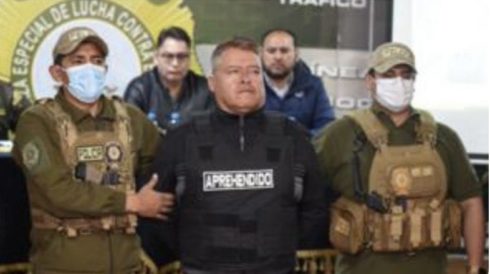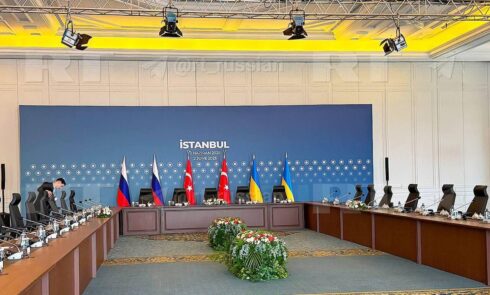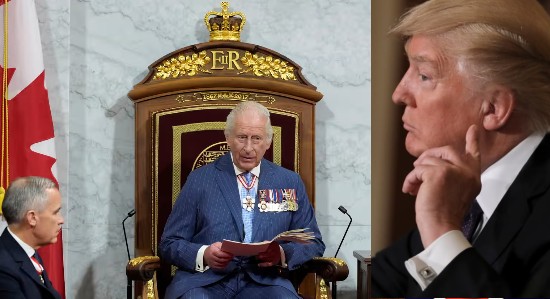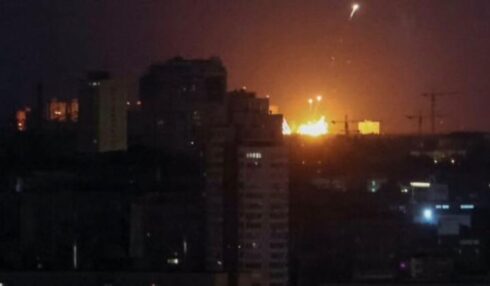A Bolivian general has been arrested and accused of mounting a coup against the government after attempting to storm the presidential palace on Wednesday. Military units led by Gen. Juan Jose Zúñiga – dismissed as commander of the Bolivian army just a day earlier – occupied the main square in the capital, La Paz, as armored vehicles rammed the palace door and soldiers tried to break into government offices.
Hours later, President Luis Arce – who had called on the public to “organize and mobilize” in defense of democracy – could be seen confronting Zúñiga in the crowded palace hallway, ordering the general to withdraw his soldiers and stand down. After Zúñiga was handcuffed and forced into a police car, a triumphant Arce raised his clenched fist to the huge crowds that had flocked to the presidential palace, signaling the defeat of the attempted coup. His defense minister Edmundo Novillo later told a news conference the government had regained “total and absolute control” over its military. “We urge the population that everything goes back to normal,” he said.
A History of Instability and Economic Woes
Bolivia has a long history of political instability – there have been almost 40 attempted or successful coups since 1946. The failed takeover comes as the landlocked South American country of some 12 million people struggles with a spiraling economic crisis that has sparked street protests in recent months. The country has been wracked by dwindling foreign currency reserves, particularly the US dollar, and shortages of fuel and other basic necessities.
The economic challenges have only exacerbated the political tensions, creating a volatile environment where trust in governmental institutions is low. This latest coup attempt, although unsuccessful, underscores the deep divisions and ongoing struggles within Bolivia. The government’s swift response to the coup highlights the fragile nature of Bolivian democracy and the constant threat posed by military and political factions vying for power.
Controversial Claims and International Reactions
As he was being arrested Zúñiga alleged – without providing evidence – that he was acting on Arce’s instructions. “On Sunday I met with the president and the president told me, ‘The situation was very nasty that this week would be critical. And so, it’s necessary to prepare something to bring up my popularity.’ And so he told me, he asked me, ‘Shall we take out the armored (vehicles)?’” Zúñiga told reporters. Justice Minister Ivan Lima denied Zúñiga’s claims, saying he “lies and tries to justify himself about a decision he took and over which he will have to answer to justice.”
The attempted coup was widely condemned by the Bolivian government and international leaders. Bolivian’s Attorney General’s Office said it has launched a criminal investigation against Zúñiga and “all the other participants” involved in the incident. It is unclear where Zúñiga is being held. Earlier Wednesday, footage from the scene showed armed soldiers occupying Murillo Plaza, a main square in La Paz where the national executive and legislative offices are located. Armored vehicles were seen ramming into the doors of Bolivian’s government palace, according to the Associated Press, as former president Morales, who is a member of Arce’s Movement to Socialism (MAS) party, said on X that a “coup d’état is brewing.”.
Evo Morales’ Bid for Reelection responsible for Political Tensions in Bolivian
Bolivian is witnessing a surge in political tensions as former president Evo Morales prepares to run for reelection against his one-time ally, current President Luis Arce, in the upcoming general elections. Morales, a leftist leader who resigned in 2019 amidst accusations of election fraud and subsequent protests, is determined to reclaim the presidency. His return to the political arena has sparked significant controversy, especially considering his prior tenure, which was marked by both economic progress and political turmoil.
The political landscape in Bolivian is further complicated by the recent actions of former army chief Zúñiga, who was detained after publicly expressing opposition to Morales’ candidacy. Zúñiga’s dismissal and subsequent detention were reportedly due to his threats to block Morales’ bid for reelection. His bold declaration to “restore democracy” and address the country’s economic challenges resonated with many, reflecting a growing dissatisfaction with the current administration and the political establishment.
Military Involvement and Government Response
The involvement of the military in Bolivian’s political affairs reached a critical point when Zúñiga addressed reporters in Murillo Plaza, flanked by soldiers, and vowed to free political prisoners, including former president Jeanine Anez. Anez is currently imprisoned for her alleged role in the deadly protests following her controversial rise to power in 2019. Zúñiga’s dramatic appeal to the public and the army’s willingness to support his cause underscored the deep divisions within the country.
In response to the escalating crisis, President Arce swiftly appointed new military commanders, including Gen. José Sánchez as the new army chief. Sánchez’s immediate order for soldiers to return to their units appeared to defuse the situation temporarily, as armed vehicles were seen leaving Murillo Plaza shortly after. Arce’s strategic move to reassign the heads of the navy and the air force further demonstrated his intent to stabilize the military and maintain control amid the political upheaval.
International Reactions and Allegations of a Self-Coup
The attempted coup and subsequent government actions have drawn widespread international condemnation. Leaders from neighboring countries and international bodies, including Paraguay’s President Santiago Peña, Mexico’s president, and the European Union, have expressed their disapproval of the unfolding events. The international community’s response highlights the gravity of the situation and the potential implications for regional stability.
Amid these developments, accusations have emerged suggesting that the government itself may have orchestrated the coup. Opposition MP Andrea Barrientos from the Civic Community party labeled the events as a “self-coup” staged by President Arce’s administration to rally support and consolidate power. This claim, while controversial, echoes the sentiments of many who view the government’s actions with skepticism. Fredy Mamani, former deputy foreign minister and an ally of both Morales and Arce, emphasized the unity of the Bolivian people against any coup attempt, despite the undemocratic nature of the military’s involvement in the political showdown.














